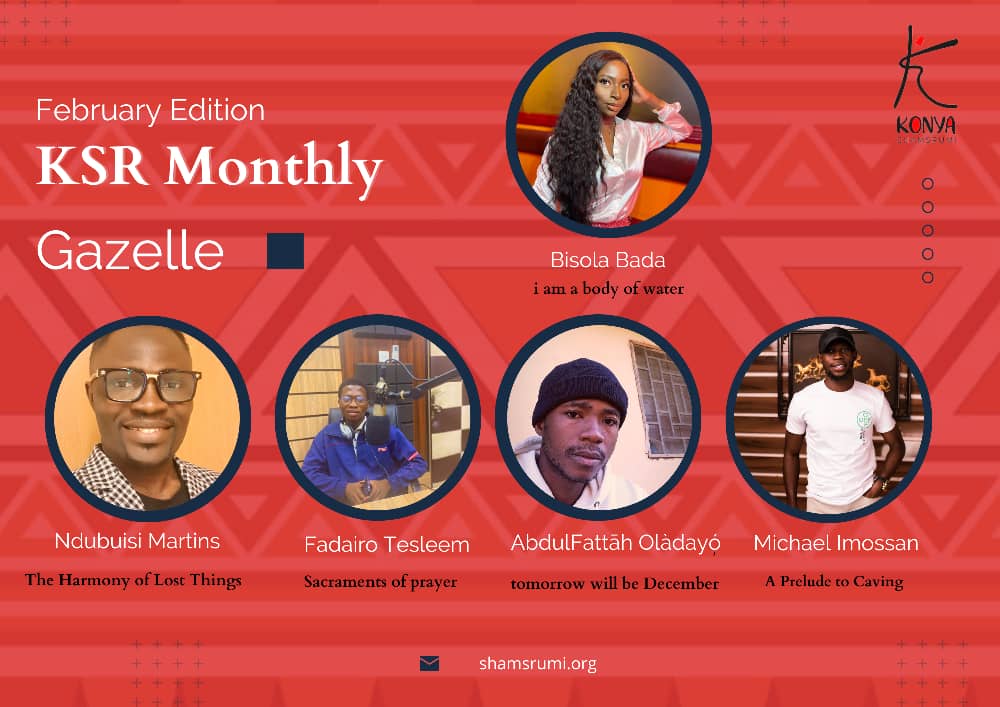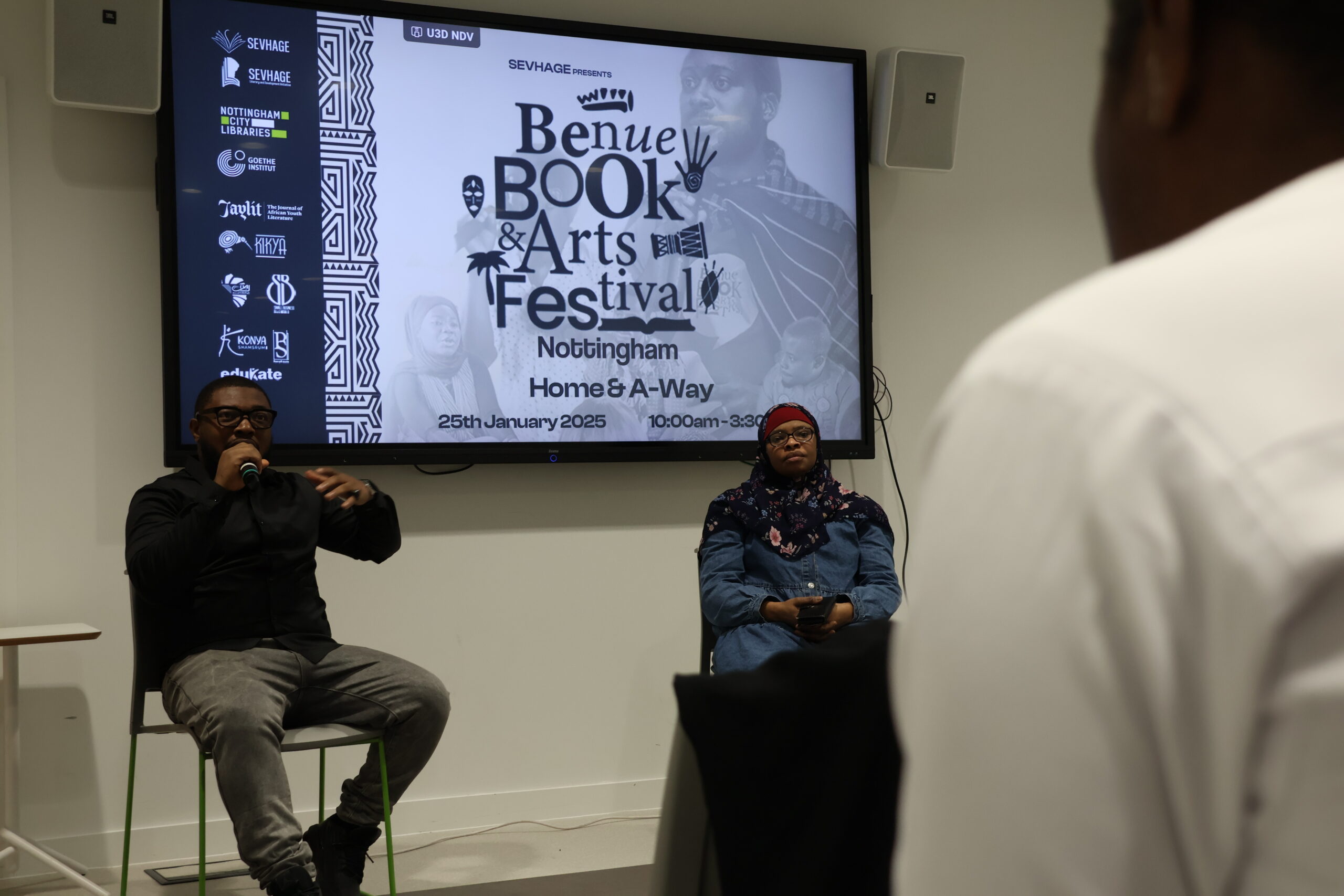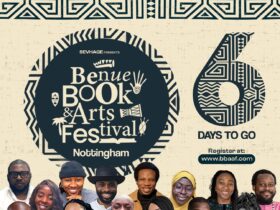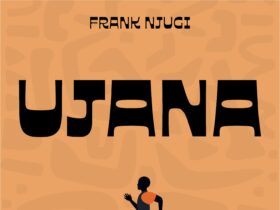To download the first edition, click here.
We are happy to announce the February Edition of our Monthly KSR Gazelles. These are even more interesting titles than we expected and we believe you will find them great companions for your reading time.

Curious to know what a poetry gazelle is? Pre-order one of these gazelles to find out or simply visit this link for more.
This pre-order tenure is going to take ten days, counting from today 22 May, and the gazelles will be finally available to download on 31 May. Feel free to order as many copies as you want. To accompany the gazelles is a poetry podcast of ten poems which shall be released on 30 May, free-to-listen and download on Anchor/Spotify and Soundcloud.
Click on the images to pre-order.
You can say Bisola Bada mounts the rostrum in her gazelle i am a body of water with declarative feminism and femininity. She has a lot to say to men who think they can get away with everything just because they are men. Some poems are about self-affirmation, the feminine body, and womanhood; some are heartbreaking. But she has something to say—“ i am a body of water / & will always be here / ready for your twilight sun / to attempt being a stone / so that it can lose balance / on the horizon.” And you must hear her! After all, as the title of one of her poems chime, “this poem does not take orders.”
Ndubuisi Martins’ poems have a Soyinka influence. The poem “Answers from the Bramble” sings like the latter’s “Abiku.” In his wonderful gazelle The Harmony of Lost Things, Martins courts the tradition of a generation of Nigerian poetry that is effacing. He is mostly polemical and wants to cause a revolution; the struggle is still the struggle to him, thus, he charges, “Let the wind / Let the pipe / Let the windpipe come . . .” But he doesn’t forget to grieve, too, this thing that makes us human, as we find in the eponymous poem, “The Harmony of Lost Things.”
Fadairo asks in what, perhaps, is the penultimate line in the corpus of grief poems among Nigerian poets today—“who says grief cannot be seen or touched?” He is mourning a friend, as well as a mother, and a grandfather, and even Nigeria. In Sacraments of Prayer, Fadairo has imbibed the virtues of a praying Muslim in attempt to navigate loss, using poetry. This is one poignant gazelle. Yet, this poignancy is what makes the poems alive with the heartthrobs of the poet.
AbdulFattāh Ọlàdayọ́’s eclectic tomorrow will be December is a straightforward gazelle. Reading his poems gives you the sense of ultimate silence—his silence—a quality of being too attentive and extremely sensitive. Ọlàdayọ́ wants everyone to go into a bit a silence once in a while; this is the power of his poetry.
Michael Imossan’s superpower—the style he is carving for himself—is the ability to be very personal in his poetry and yet be relatable to readers. Often, you’d hear his lines spliced with explainers—an interesting technique. In A Prelude to Caving his vulnerability is palpable and almost every line is written as if to approach salvation: “Once, on my way to write a poem about country, I googled for / flowers with shorter life span and saw us: Morning Glories / at the precipice of dusk.” Dig into this gazelle; let Imossan speak to you.
We look forward to a great year of poetry with you as you place your pre-orders and share the links to other lovers of poetry.
Konya Shamsrumi is an African poetry collective excited about all things poetry. The Gazelles Project, whose press release was published here and official Call for Submission here, was created to put money in our poets’ pockets while building a vibrant African poetry community by exploiting modern and digital-savvy means of appreciating, consuming and distributing poetry. We also wish to use it to build a database of African poetry lovers where we can bring you all the good news and books and publication about poetry continent-wide. Why not join our community? Make that pre-order and visit shamsrumi.org and digitial.shamsrumi.org for more.
For more information visit here.
- Wendy Okeke Portrays Her Humanity in Grief’s First Kiss is an Avalanche - February 28, 2025
- Why We Were Walls and New Openings – A new anthology of art and writing from Creative Writers’ Club, ABU Zaria - June 1, 2024
- Register for an engaging 10-day workshop on essay writing with Carl Terver - March 4, 2024

















Leave a Reply